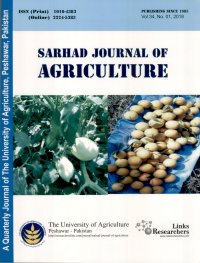Regulatory Effects of Garlic Extract (Allium sativum L.) on Hematobiochemical Markers in Rabbits Intoxicated with Paracetamol
Regulatory Effects of Garlic Extract (Allium sativum L.) on Hematobiochemical Markers in Rabbits Intoxicated with Paracetamol
Bashir Ahmad1*, Ali Muhammad Yousafzai2, Waqar Ali1, Ikram Ilahi1, Farman Ullah3, Saeed Ahmad1, Ayaz Ali Khan1, Umair Ahmad2 and Hafsa Maria2
ABSTRACT
The current research was aimed to examine the effects of garlic aqueous extract on the levels of hematobiochemical parameters and several liver related serum parameters in paracetamol-intoxicated rabbits. Moreover, the amount of (DPPH) free radicals that garlic aqueous extract scavenged at various doses was used to determine its antioxidant capacity. There were five groups each of which contains eight rabbits as experimental animals. These groups were, group A (control animals), group B (intoxicated animals), group C (Animals treated with standard drug), group D and group E (extract was given at doses of 100 and 300 mg/kg body weight after paracetamol intoxication) retrospectively. The results were contrasted with those of the common hepatoprotective medication silymarine (50 mg/kg body weight). When contrasted to toxic control rabbits, the highest dose of garlic aqueous extract i.e. 300 mg/kg b.w excellently decreased the high serum rates of alkaline phosphatase (ALP), alanine transaminase (ALT), and aspartate transaminase (AST). The outcomes of the extract-treated rabbits were comparable to those of the group of rabbits given silymarine. RBC, platelets, haemoglobin, MCH concentration, and HCT levels did not significantly alter after treatment with garlic aqueous extract and silymarine. However, a substantial (P 0.05) rise in the overall WBC count was seen. The current research findings revealed that silymarine, a common drug for hepatoprotection, might be replaced by garlic aqueous extract as a herbal remedy. However, more research is needed to identify the bioactive ingredient and determine the effectiveness of this herbal substitute.
To share on other social networks, click on any share button. What are these?








